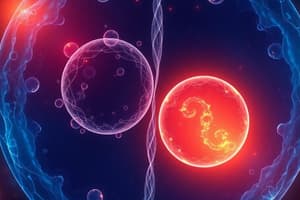Podcast
Questions and Answers
Define the term Homologous Chromosomes.
Define the term Homologous Chromosomes.
They are the same similar size, similar genetic information.
Define the term Sister Chromatids.
Define the term Sister Chromatids.
Chromatids that have duplicate (happens in both).
What does the statement 'Meiosis is a process of cell reduction' mean?
What does the statement 'Meiosis is a process of cell reduction' mean?
Reduces the number of chromosomes to half the normal number.
Which part of meiosis is similar to mitosis?
Which part of meiosis is similar to mitosis?
Sister chromatids separate during interphase.
Sister chromatids separate during interphase.
What process results in haploid cells?
What process results in haploid cells?
In which type of cell division does mitosis occur?
In which type of cell division does mitosis occur?
During which process do homologous chromosomes pair?
During which process do homologous chromosomes pair?
What is the final result of meiosis?
What is the final result of meiosis?
Cell division occurs twice in mitosis.
Cell division occurs twice in mitosis.
Where do replicated chromosomes line up in the spindle?
Where do replicated chromosomes line up in the spindle?
What is the final result of mitosis?
What is the final result of mitosis?
What type of cells are formed through mitosis?
What type of cells are formed through mitosis?
Define crossing over. When does it occur?
Define crossing over. When does it occur?
Study Notes
Key Concepts of Cell Division
- Homologous Chromosomes: Chromosomes that are similar in size and genetic information, crucial for genetic diversity during reproduction.
- Sister Chromatids: Duplicated forms of a chromosome, present in both mitosis and meiosis, which are identical copies.
- Meiosis Definition: A reduction division process that halves the chromosome number, crucial for sexual reproduction.
Comparison of Mitosis and Meiosis
- Meiosis II vs. Mitosis: The second stage of meiosis (Meiosis II) resembles mitosis, as both involve the separation of sister chromatids.
- Sister Chromatids Separation: In both processes, sister chromatids split during cell division; this occurs during interphase.
- Haploid Cell Formation: Meiosis results in the production of haploid cells, essential for gametes (sperm and eggs).
Outcome of Cell Division
- Mitosis Outcome: Yields two diploid daughter cells, maintaining the original chromosome number.
- Meiosis Outcome: Results in four haploid cells, each with half the original number of chromosomes due to two rounds of division.
Stages and Processes
- Cell Division Sequences: Mitosis involves a single sequential process referred to as P-M-A-T (Prophase, Metaphase, Anaphase, Telophase).
- Homologous Chromosomes Pairing: Critical for meiosis, allowing genetic recombination and diversity.
- Final Cell Count: Mitosis produces two final daughter cells, while meiosis culminates in four distinct cells.
Additional Concepts
- Crossing Over: The exchange of genetic material between homologous chromosomes, occurring during meiosis, which enhances genetic variability.
Studying That Suits You
Use AI to generate personalized quizzes and flashcards to suit your learning preferences.
Description
Test your knowledge on mitosis and meiosis with these flashcards from Worksheet 17. Each card focuses on key terms and concepts, such as homologous chromosomes and sister chromatids, as well as understanding the significance of meiosis in reducing chromosome numbers. Perfect for reinforcing your understanding of cell division.




